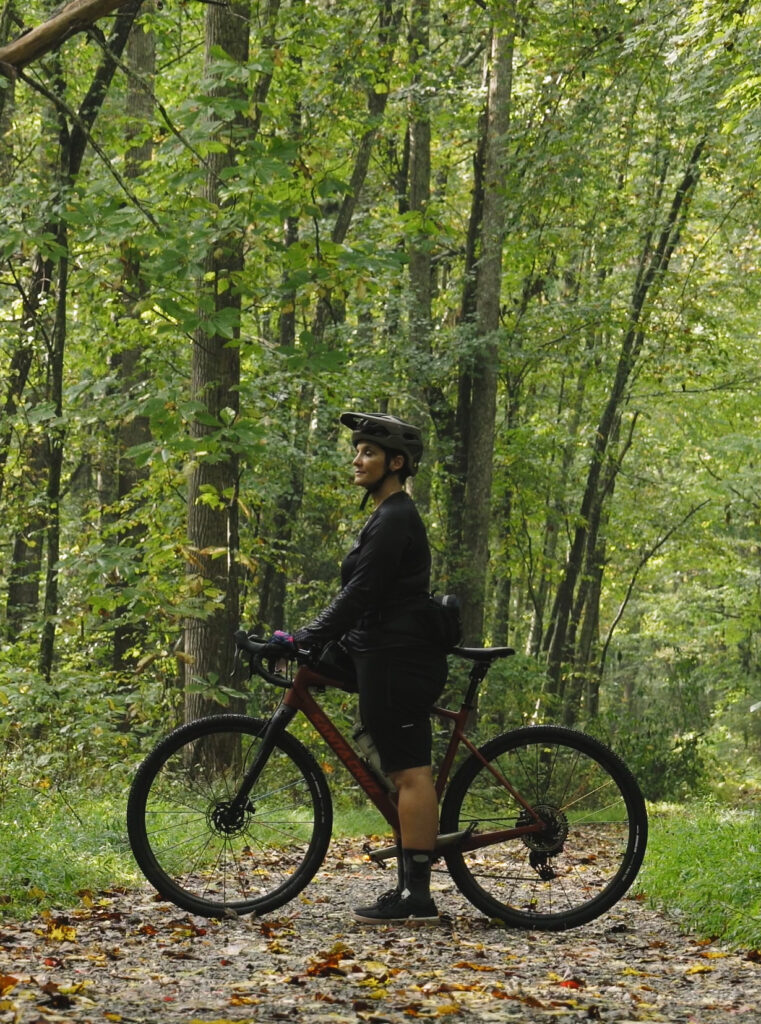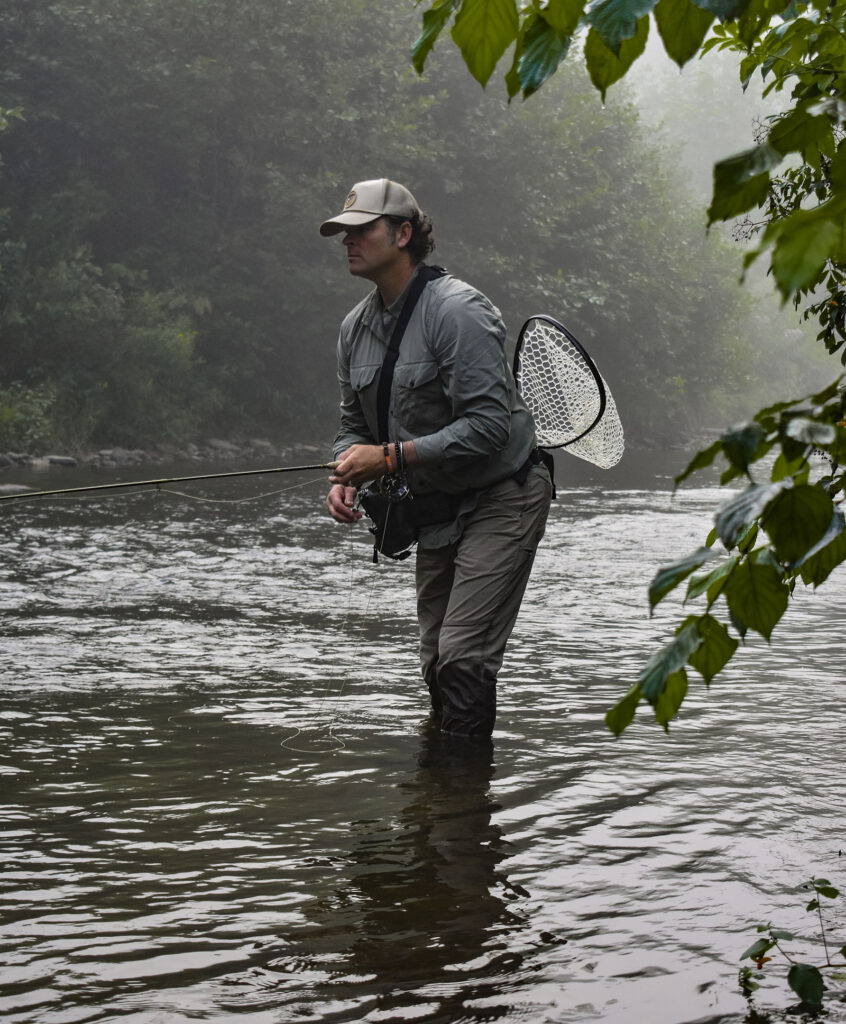
MADE BY MOUNTAINS STORY
WNC FLY FISHING "THE FUTURE IS DOWNSTREAM"
The breadth and variety of fishing opportunities present in WNC make it one of the best places to learn to fish. There’s a lot of water and it’s really accessible. We also have a huge number of fly shops and guides, a concentration of industry that doesn’t exist in the rest of the country.
Western North Carolina celebrates a unique and tight knit fly fishing community with an immense impact as an outdoor recreational economic driver. As the popularity of recreational fishing in these waterways grows, more guide and gear companies are born in the region, and generations of families and more diverse communities become involved, we must work together in conservation efforts to ensure clean headwaters and healthy fish populations, particularly our native Brook Trout species, which are an indicator for all other river life. Written story by Graham Averill. Video Directed and Edited by Robb Leahy.
on the river
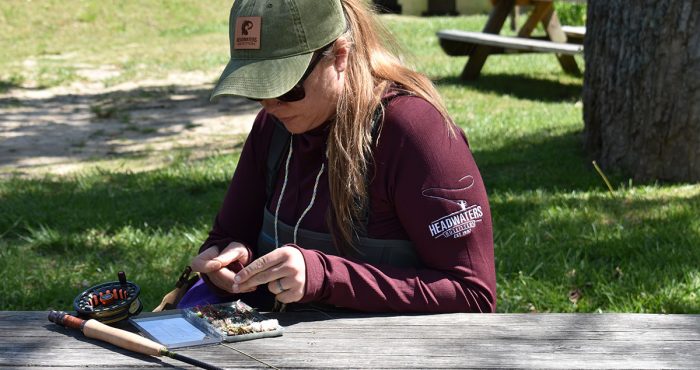
Jessica Whitmire can’t imagine life without the French Broad River. The WNC native grew up on its banks, in the heart of Transylvania County. She learned to cast for trout into its eddies, paddled its rapids, took her first driving lessons on the backroads along those banks. Today, Whitmire is the Director of Operations for Headwaters Outfitters, a fly fishing guide service and shop that her parents co-founded when she was just 7 years old, largely out of their love for the French Broad.
“My mom was the person that made you pick up trash while on an adventure,” Whitmire says. “There isn’t a paddling trip I can remember where she didn’t end up with a big bag of trash she collected.”
The French Broad, and the endless miles of feeder streams that tumble off the mountains surrounding it, have been the canvas for Whitmire’s life, both as a child and as an adult. And, Whitmire is not an outlier in this respect. The mountains of Western North Carolina are pieced together by thousands of miles of streams and rivers just like the French Broad River, that serve as the connective tissues between individuals, cultures and communities.
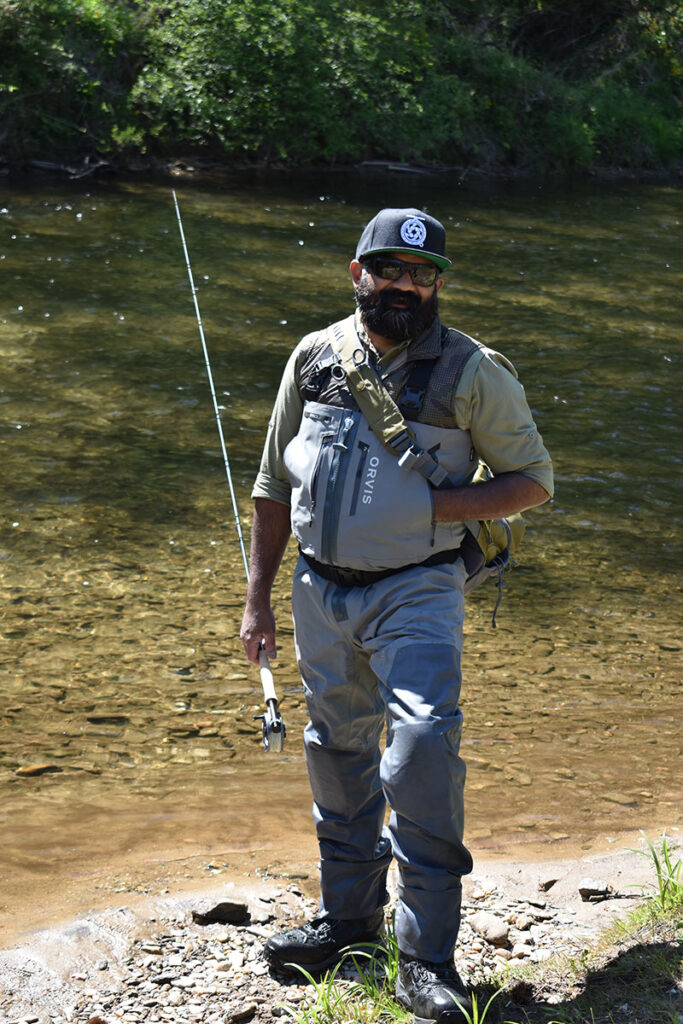
Photo by Joanna Brown
finding identity
The trout that thrive in those streams haven’t just fed our bodies, they’ve helped craft our identities. from time immemorial when the Cherokee fished Brook Trout before Europeans arrived, all the way to today. Just consider Sav Sankaran, a first-generation American and son of immigrant parents, who found his sense of place in part through fishing the waters of Western North Carolina.
“Issues of identity and sense of place are central to my story,” Sankaran says. “I found my American identity in the pursuit of trout. My sense of ‘home’ was forged knee deep in Appalachia’s trout streams.”
Sankaran guided and advised local fly fishing trips for years out of Orvis’ Asheville shop, and now his role has grown to a national and global stage, serving as the Inclusion and Engagement Business Partner at The Orvis Company. He works tirelessly to introduce more people to the joys of casting for the very fish that helped him find his place in the world.
“I have a tattoo of a brook trout on my arm as a way to claim my identity,” Sankaran says. “I was made by the wildness of this place. And trout have always been at the center of Southern Appalachian culture.”
A $1.38 Billion STATE ECONOMY
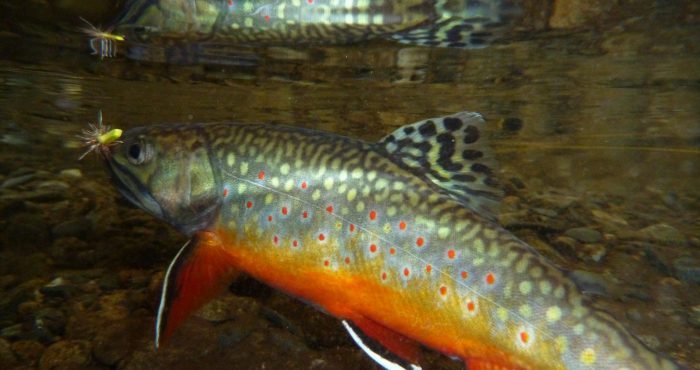
Today, those trout aren’t just central to local culture, they’re central to our local economy. According to a newly published economic impact report by the NC Wildlife Commission, the trout fishing industry contributes $1.38 billion to the state’s economy. That money comes from anglers buying licenses and gear, visitors eating at local restaurants, hiring guides and staying in hotel rooms…the list goes on.
Locals like Sankaran and Whitmire are working hard to make sure people of all genders and races feel comfortable casting a line in our streams. Through Pisgah Area Women’s Fly Fishing, Whitmire works to create safe spaces for women to be introduced to fly fishing. Through Orvis’ outreach and education initiatives and as a Board Member of the Minority Outdoor Alliance, Sankaran actively encourages more people of color to try their first roll cast. And he thinks Western North Carolina is the ideal place to introduce new people of all backgrounds to the joys of fly fishing.
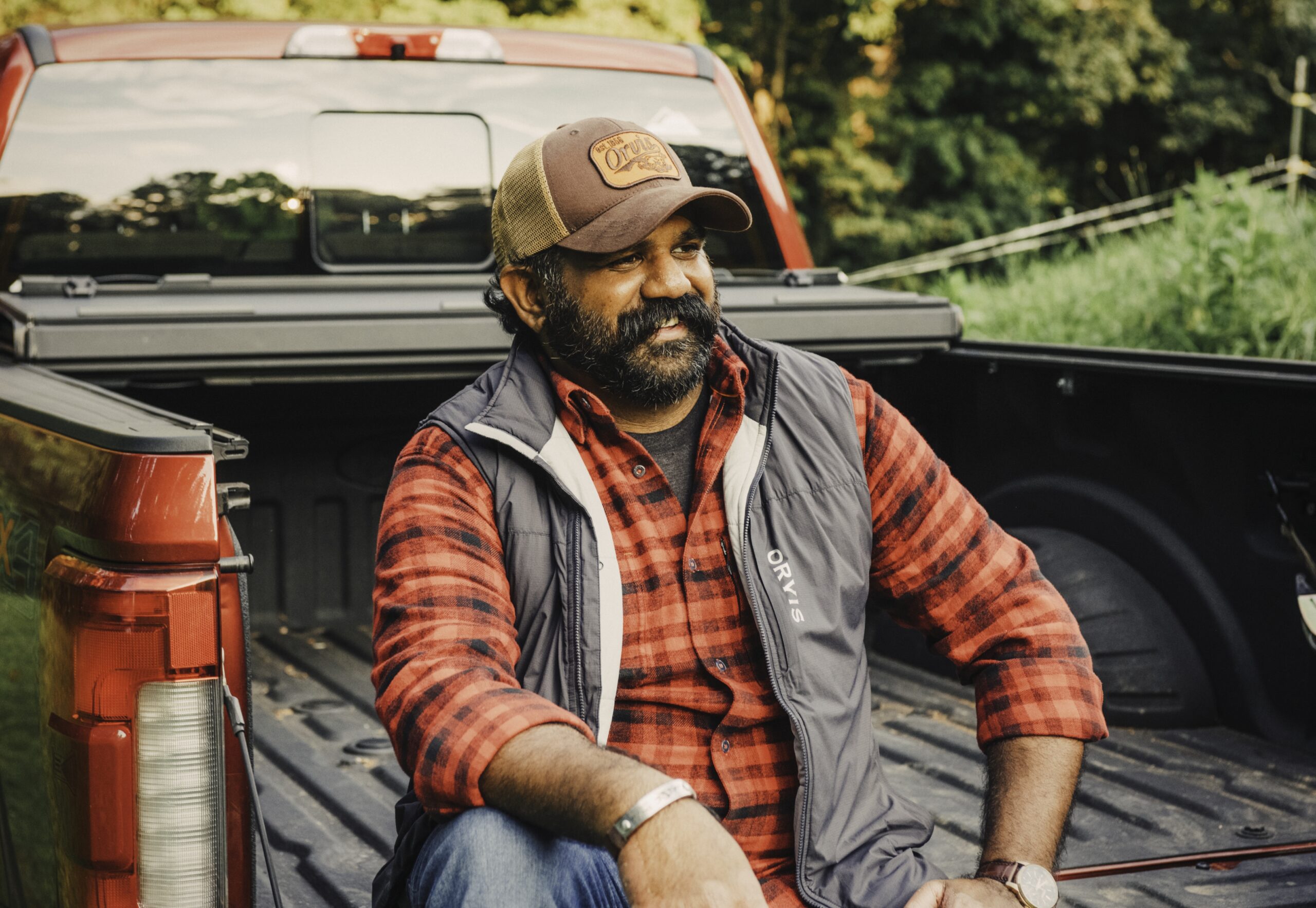
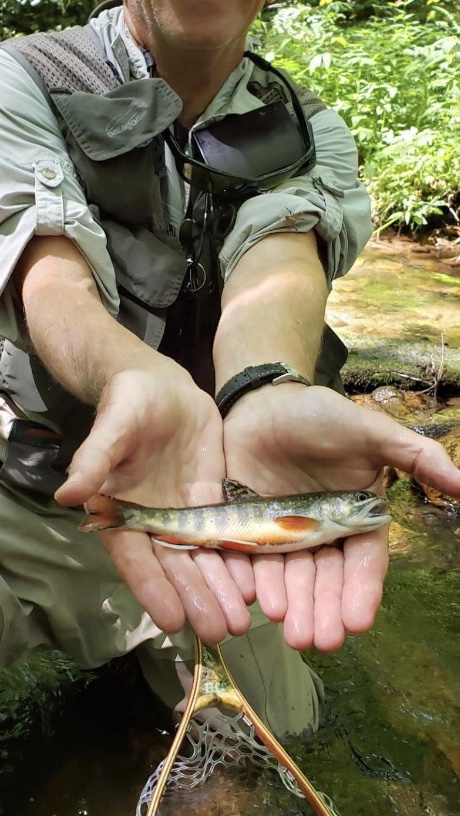
Photo Courtesy of Jay Hawthorne; Land o' Sky Trout Unlimited
WNC'S WATERS
On WNC’s waters, you can hike five miles into the backcountry to fish without seeing another person all day, or you can stop at a roadside hole and cast a line for 20 minutes with your buddies on the way home from work. The quality of the streams in this area are unmatched. Take Great Smoky Mountains National Park, which sits within a day’s drive of some of the largest cities in America, but still offers pristine mountain fishing.
“There are few places in the world that you can still catch native trout, in their native habitat that is relatively unimpaired,” says Matt Kulp, Fishery biologist for Great Smoky Mountains National Park. Kulp is talking specifically about Southern Appalachian Brook Trout, the only trout species native to Western North Carolina. They’re small, feisty, and prone to cold water at high elevations. Unlike the lumbering rainbow trout, “Brookies” are hard to catch and even harder to protect. The threats are numerous, from acid rain to invasive species to steep-slope development, but keeping this native fish alive and well is more important now than ever, because the health of brook trout is connected to the health of the human population.
Conservation flows downstream
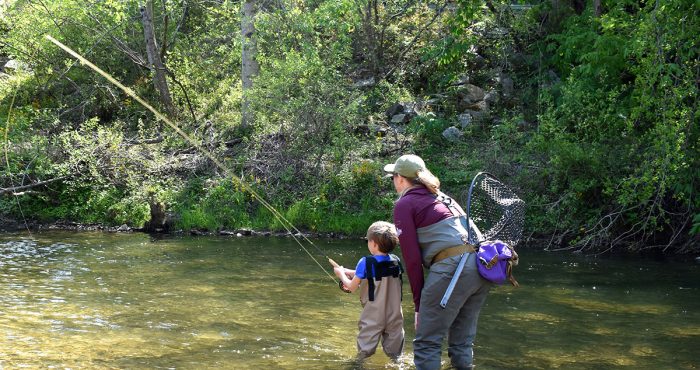
“Trout conservation flows downstream,” says Jake Rash, the Coldwater Research Coordinator for the NC Wildlife Resources Commission. “If we’ve helped conserve native Brook Trout, we’ve helped the top of the watershed be in a better place, which means that water starts flowing downstream to the animals, people, and communities that depend on it in much better condition than it would be otherwise.”
Brook Trout conservation is a collaborative effort. Everyone has to buy in, from the legislators passing the laws to non-profits, like Trout Unlimited, that work to implement conservation strategies on the ground, to the kids learning about the fish on their school field trip. Just ask Woody Platt. The professional bluegrass musician worked to restore the small trout stream on his family farm in Transylvania County, and knew he would need a lot of help.
“Everyone piled on,” Platt says of his conservation project. “It was wonderful to see all these agencies work together and focus on doing one job collectively.”
community in these mountains
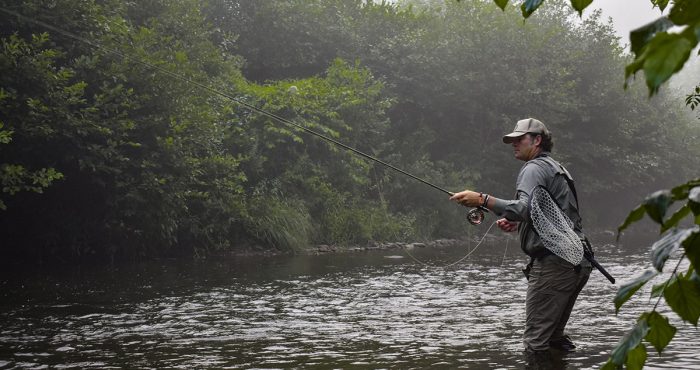
Trout Unlimited spearheads a lot of the conservation efforts that impact our rivers, but they know they can’t do it alone. “We have an ambitious conservation mission,” says Beverly Smith, VP for volunteer operations for TU, “and we know if we thought we were just gonna do this by ourselves, we would be ineffective and we wouldn’t get it done.”
Local anglers know we need to see more of that sort of collaboration moving forward, which is one of the reasons efforts to diversify the sport are so important. Yes, everyone should know what it feels like to catch that first trout on a fly, and everyone should feel at home in the streams of Western North Carolina. But a more diverse angling population means a larger pool of conservations protecting those trout and their streams.
“When someone falls in love with water and trout, they’re more likely gonna fall in love with protecting that,” Platt says.
Sankaran agrees, and thinks that urge to protect is inevitable. “There’s an allure to Appalachia. It’s rooted in the mountains’ inherent ancientness. The settings you find yourself in when chasing trout in the mountains allow you to connect to that feeling. These mountains have gravitas.”
A MADE X MTNS production by videographer, Robb Leahy. Additional Footage by John Dupre and Joel Sandovos. Additional media provided by Trout Unlimited, Matt Kulp, David Wise, Rigged and Ready, Storyblocks, and Ian & Charity Rutter. Interviewers are Amy Allison and Joanna Brown.
Special thanks to: Trout Unlimited – Land O’ Sky, Trout Unlimited – Pisgah, Orvis, Fish Cherokee, NC Wildlife Resources Commission, Great Smoky Mountains National Park, Headwaters Outfitters, Rigged and Ready, Outdoor Business Alliance of WNC, Brown Folks Fishing, Minority Outdoor Alliance.
Made By Mountains Stories
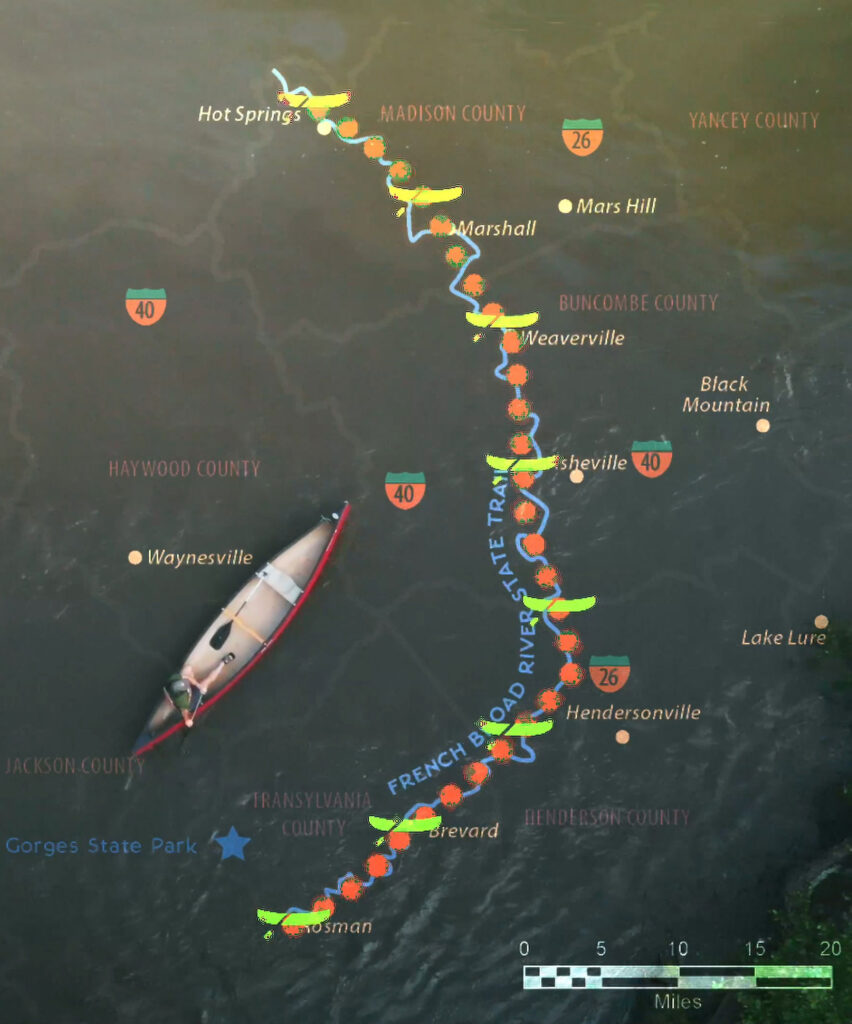
The French Broad Paddle Trail
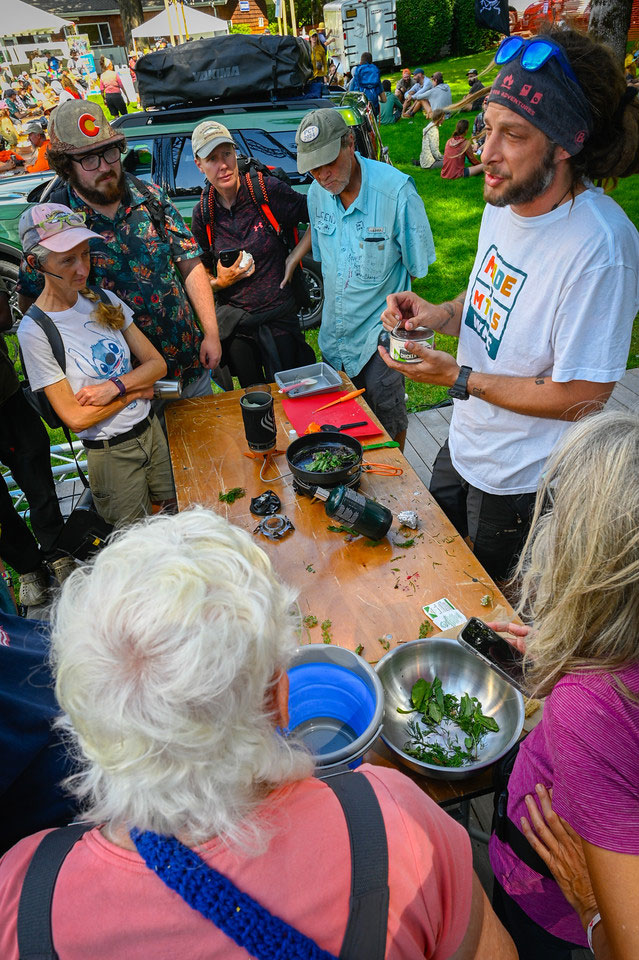
Food For Adventures
